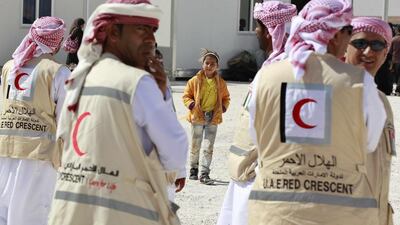Humanitarian workers in Yemen’s third city, Taez were attacked on Wednesday by unknown gunmen, the Emirates Red Crescent said.
The attack targeted ERC medical staff who were working in a mobile healthcare clinic in the city.
Information about casualties and those responsible for the attack is yet to be made available.
Aid workers were previously targeted with threats and intimidation in the war-torn country, especially in areas controlled by the Iran-backed Houthi rebels.
"The UAE strongly condemned the cowardly terrorist shooting attack targeting Emirates Red Crescent medical staff," Abu Dhabi's foreign ministry said.
The targeting of humanitarian workers is a “flagrant violation of international norms and conventions, which provide special protection for aid and rescue workers”, it said.
The ministry said it rejected “all forms of violence and terrorism aimed at undermining security and stability in contravention of religious and human values and principles”.
The ERC denounced the attack and said targeting humanitarian workers was a breach of international treaties and covenants.
The organisation "expressed its condemnation and deep regret for the terrorist act”, it said on Twitter.
Houthis control western parts of Yemen and the north, including the capital, Sanaa. The rebels have besieged Taez, a city of 500,000 inhabitants, for more than five years.
The city is under the control of the internationally recognised government.
Earlier this year, two members of the ERC were found dead in Aden after being kidnapped.
The bodies of Ahmed Fuad, 42, co-ordinator of the ERC's relief operations, and his colleague Mohammed Tariq, 36, were found at a deserted building in Kabuta city in north-east Aden.
International humanitarian agencies called for the protection of aid workers because attacking them could jeopardise efforts to assist millions of civilians caught in what is already the world’s worst humanitarian crisis.
Yemen’s five-year conflict has killed more than 100,000 and created a large-scale humanitarian crisis.
Nearly 80 per cent of the population lives off humanitarian aid while millions are on the brink of starvation, leaving them highly vulnerable to disease, including the coronavirus pandemic.


